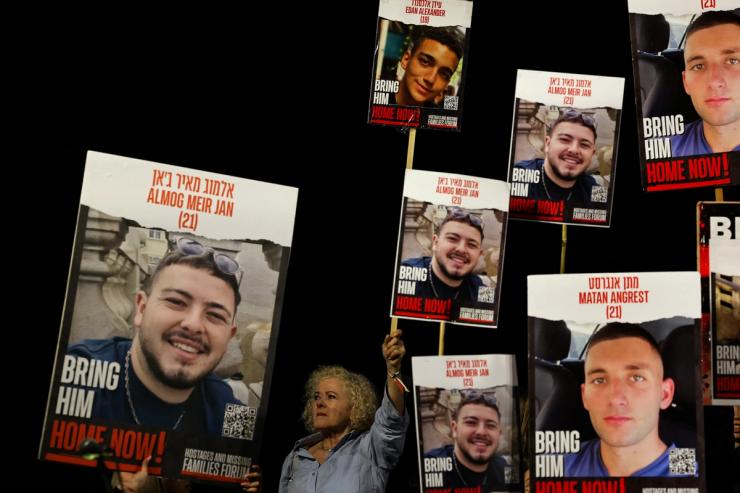The Scoop
The U.S.-based Richardson Center is playing an under-the-radar role alongside Qatar in its efforts to negotiate the release of roughly 110 hostages still held by the militant Palestinian group, Hamas, in the Gaza Strip.
Groups representing the families abducted on Oct. 7 have retained the Center, which was established by the late American politician and diplomat Bill Richardson, to develop strategies that avoid landmines and offer their relatives the best chances of getting home, two people working with the families told Semafor. These include extensive consulting on public messaging, media engagements, and insights into the overall hostage-negotiating process. The Richardson Center didn’t respond to an inquiry about whether it’s speaking directly to Hamas or other parties that might be able to influence its decision-making.
The Richardson Center has gained prominence in recent years due its central role in helping to gain the release of a string of Americans imprisoned by regimes hostile to the U.S. These have included: the basketball star Brittney Griner, jailed by the Russian government in 2022; Danny Fenster, a journalist arrested by the Myanmar junta in 2021; Xiyue Wang, a Princeton graduate student held in Iran from 2016-2019; and Otto Warmbier, an American student jailed in North Korea from 2016-2017. (He ultimately died of injuries sustained in prison.)
Bill Richardson played a central role in negotiating prisoner releases going back to his tenure in the Clinton administration. His Center is now led by Executive Director Mickey Bergman, a former Israel Defense Forces paratrooper turned hostage negotiator. Bergman has been regularly meeting in Washington with the families of the hostages as their captivity enters its third month.
“Bergman meets with all of the delegations of families and spends a lot of time consulting them — on best practices for hostage negotiations, like what’s happening behind the scenes, what they should be expecting,” said one of the people working with the families.
Bergman and the Richardson Center’s position is strengthened by its close collaboration and partnership with the government of Qatar, which is leading the negotiations with Hamas. Qatar has funded the Center since at least 2019 and has provided logistical support for its operations.
In this article:
Jay’s view
Bergman and the Richardson Center focus their work on a strategy they call “fringe diplomacy,” which involves using relationships and negotiating tactics normally off-limits to active government diplomats and officials. But this approach will face challenges in the case of Hamas, which the U.S. and Europe designate as a terrorist organization and whose leaders are either under Israeli fire in Gaza or closeted away in Qatar and Turkey.
Bergman has described his approach in podcasts and television interviews in recent years. In the cases of Iran, North Korea and Myanmar, he said the Center’s success was predicated on establishing personal relationships with leaders from those governments and finding incentives for them to release the imprisoned Americans. This often involves prisoner exchanges and financial inducements to regimes in conflict with the West. Bill Richardson, who died this September, said: “Often, the price we pay for bringing our fellow Americans home to their families is unseemly, but it is the right thing to do.”
Bergman has also stressed the importance of establishing trust with the families and keeping them constantly up to date on the state of the hostage negotiations.
Bergman is closely coordinating his work with the Qatari, U.S., and Israeli governments, said the two people working with the families. Qatar successfully won the release of 100 Hamas-held hostages last month in exchange for Palestinian women and children imprisoned in Israel. But U.S. officials have said in recent weeks that negotiations have been bogged down following Hamas’s reneging on a pledge to release all the remaining women and children and the difficulty of negotiations for men and Israeli soldiers.
U.S. officials estimate that eight of the roughly 110 hostages still being held are American.
“Hamas, at the last moment, chose to recategorize young women who are not in the Israeli military, many of whom were kidnapped and held hostage from the music festival … as soldiers,” said a senior U.S. official last week. “They’re not soldiers.”
Room for Disagreement
The longer the hostage crisis continues, the more difficulty the Richardson Center will face in keeping unity among the families and the negotiators, the two people working with the families told Semafor.
Qatar, while negotiating with Hamas, has also served as one of the organization’s primary financial and diplomatic backers in recent years. Some of the families have sought to speak out more critically about Doha due to its Hamas ties and charge the Qatari government with ultimately being responsible for their relatives’ safety. They’ve also been critical of the International Red Cross, which has been unable to access the hostages in Gaza or provide them with medical support.
Bergman has advised the families against publicly criticizing the Qataris or the Red Cross, according to the two people, noting Doha’s leverage over the entire negotiating process. But the families’ willingness to stay quiet appears to be waning. “I’m hearing much more willingness by the families of the hostages to do pressure campaigns,” said the person working with the families, which could include protests against the Qatari government.
Notable
CIA Director Bill Burns met in Warsaw Monday with Qatar’s Prime Minister and the head of Israel’s spy agency Mossad to try and resume hostage releases by Hamas.


